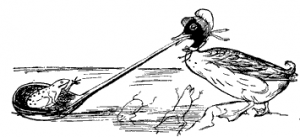Adventures in cutlery.
Dear Word Detective: In what year did Lord Runcible invent the Runcible Spoon? And why was it then named after him, rather than just calling it a “spork” or a “foon”? — David Paul.
“Foon”? Dare I confess that “foon” is new to me? Yea, furthermore, that it pleaseth me? Oh well, perhaps I’m just easily amused. I’ve never been fond of “spork,” however, because it sounds like the name of some “extreme” sport, perhaps one involving bungee cords and cutlery. And if one were to assume that “spork” is an onomatopoeic or “echoic” formation, a word concocted to sound like the thing or action it denotes, being “sporked” sounds distinctly painful. Of course, “spork” isn’t echoic, it’s a “portmanteau word,” a combination of two or more existing words, “spoon” and “fork” (in the spirit of “motel,” combining “motor” and “hotel”). (“Portmanteau” is an old word for suitcase, and the term “portmanteau word” was invented by Lewis Carroll.) Anyway, sporks have been in use since at least the 19th century, although the word “spork” is apparently a 20th century invention and is still a trademarked term in the UK.
The provenance of “foon” (also a combination of “fork” and “spoon”) seems to be a mystery. While a Google search produces almost two million hits for the word, “foon” is apparently also a fairly common surname, so that’s no help. According to the Oxford English Dictionary, “foon” was in common use as a form of the word “foe” from the 14th though the 17th centuries, which is a shame since it seems like such a friendly little word.
Meanwhile, back at your question, the “spork/foon” was not invented by Lord Runcible, who never invented anything because he didn’t exist, so feel free to change your name to Lord Runcible the First. “Runcible spoon” is today usually employed as another name for a spork, but that application is, as we shall shortly see, unwarranted.
The term “runcible spoon” was invented by the English writer Edward Lear, whose “nonsense poems” have entertained children and adults since the late 1800s. Lear’s “The Owl & The Pussy-Cat,” written in 1871, contains the first mention of “runcible” in the verse “They dined upon mince and slices of quince, Which they ate with a runcible spoon, And hand in hand on the edge of the sand, They danced by the light of the moon….”
Lear used the word “runcible” in several other works, in which he mentioned a “runcible raven,” a “runcible cat” and a “runcible wall.” Unfortunately, Lear never explained what “runcible” meant or where he’d found it. One theory is that “runcible” is derived from the archaic term “rouncival,” meaning “large.” It’s also entirely possible Lear simply made up the word.
Interestingly, in another of Lear’s works, “Twenty-Six Nonsense Rhymes and Pictures,” he offers a drawing of “the Dolomphious Duck” catching “Spotted Frogs for her dinner with a Runcible Spoon.” The spoon in the drawing is simply a large, long-handled and deep spoon (resembling a ladle, in fact), definitely not a serrated “spork.” So Lear invented the term “runcible spoon,” but apparently never intended it to mean “spork.”





I just wanted to tell you how much I love your website! You rock.
Excellent! Excellent! They dined upon mince and slices of quince, Which they ate with a runcible spoon.
I thought I’d mention that there is a furthar belief of Edward Leah’s naming of the Runcible spoon, it was in fact a large ladle type spoon with holes and the word runcible was derived from Run simple the fact that liquid simply ranm away from the solid when scooped up. However, the nonsense that came out of Leah, suggests that it was purely invented and had no bearing on anything. The run simple theory has been passed down within my family for 70 odd years and I’ve not heard a better explanation in all that time.
Do with it as you will, but if you ever come up with something definnitive, please keep me informed.
always thought spork referred to the foldable, combination utensil packed with camping gear to save space and weight. Combining a fork and spoon for dinners at a campfire. If it had a sharpened edge, as defined here, you would be in danger of slicing open your lip if you attempted to eat with it! Found your definition while checking out an answer to a crossword puzzle clue. Just wonder why you would need a sharpened edge to spear a pickle?
Edward Lear was, quite simply, nuts. If you are Posh and Nuts, you are an eccentric. However, the word “runcible” is rounded, smooth, flow to it that it is appealling when spoken. This is infinitely preferable to the word ‘spork’ which, to be honest, sounds like a bowlderised expletive!
A very late comment… thank you for such interesting information. I have always believed that a Runcible spoon was one that had the spoon part at right angles to the handle. They were made for small children, and sometimes had a handle looped back underneath to make it easier to hold. They were often given as Christening gifts, and plated with silver… accompanied by another little eating tool, called a Pusher.
I’m pretty sure the word runcible is just a fancy word for fancy. Considering it is most likely completely made up and is used somewhat ambiguously, this seems like the most logical definition.